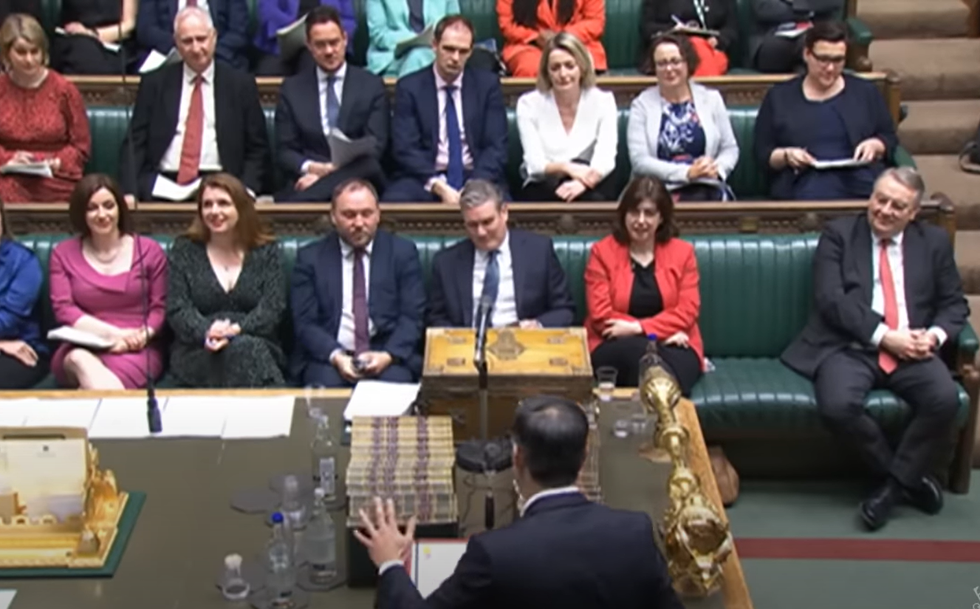Scrapping National Insurance would cost the Government £46billion, according to Labour
PARLIAMENTLIVE
Scrapping National Insurance would cost the Government £46billion, according to Labour
Don't Miss
Most Read
Trending on GB News
Prime Minister Rishi Sunak will not raise the state pension age to fund his plan to abolish National Insurance, Government sources have told GB News.
It follows an exchange in the House of Commons yesterday when Labour party leader Sir Kier Starmer asked Mr Sunak how he would fund the tax cut, and whether he would rule out raising the state pension age to pay for the move.
While Sunak explicitly ruled out cuts to the state pension to fund the “black hole in his spending plans”, the Prime Minister was pressed on whether he would rule out raising state pension age to 75, which was suggested by Conservative peer Lord Frost last year.
In Prime Minister’s Questions, Starmer said: “Understandably, that will cause some alarm, so will the Prime Minister rule out forcing people to delay their retirement by years and years in order to fulfil his £46 billion black hole?”
Sunak replied: “I have answered this multiple times, but I am happy to say it again: the Conservative party is the party that has delivered and protected the triple lock.”
Sources close to Government have told GB News that the Prime Minister has ruled out increasing the state pension age to cover the spending.

In the Chancellor's Spring Budget in March, workers got a further 2p cut in their National Insurance contributions
PARLIAMENTLIVE
When asked whether the state pension could be cut to fund his ambition to scrap National Insurance contributions altogether, Sunak said: "Of course we can rule that out, and (Sir Keir) should stop scaremongering, because it's thanks to the triple lock that we've increased pensions by £3,700 since 2010 and they will rise in each and every year of the next Parliament.
“But its Labour that always hits pensioners hard. It is his mentors Blair and Brown that broke their promises, raised pension taxes by £118billion and delivered an insulting 75p rise in the state pension."
In the Chancellor's Spring Budget in March, workers got a further 2p cut in their National Insurance contributions (NICs), just months after a 2p cut came into effect in January.
Chancellor Jeremy Hunt then told MPs he wanted to scrap the tax entirely because he believed that “the double taxation of work is unfair, our long-term ambition is to end this unfairness”.
What is National Insurance?
Workers pay National Insurance contributions to qualify for certain benefits and the state pension.
It is mandatory to pay National Insurance if someone is 16 or over and they are either an employee earning more than £242 per week from one job, or self-employed and making a profit of more than £12,570 a year.
In the tax year ending in March 2023, contributions from companies and workers raised £178billion, according to the House of Commons Library.
This makes it the second-biggest tax in the UK in terms of revenue raised, after income tax.
Labour estimates that the amount contributed by workers – the portion it is assumed Hunt wants to scrap – adds up to £46billion.
Commenting on the implications of scrapping National Insurance completely, Tom Selby, director of public policy at AJ Bell said: “Ditching employee NI would simplify the system, leaving most people subject to income tax on their earnings alone.
“However, it would also inevitably place pressure on the government to hike other taxes, including potentially income tax, in order to fill the void.
“There are also practical implications that would need to be thought through. For example, the current state pension system is centred around the NI framework, with workers building up entitlement to the benefit based on their NI contribution record.
“Scrapping NI would therefore require a new system of NI credits to be introduced, assuming the state pension remains in its current form.”
National Insurance contributions are used to calculate one’s state pension amount.
To qualify for any state pension, Britons need at least 10 qualifying years of contributions. For those who qualify for the new state pension, people usually need at least 35 qualifying years to get the full amount.
A qualifying year is one in which someone was:- working and made National Insurance contributions
- getting National Insurance credits for example if they were unemployed, ill or a parent or carer,
- or paying voluntary National Insurance contributions
- £221.20 per week for the new state pension (for those who reached state pension age after April 2016). This will be £11,502.40 a year.
- £169.50 per week for the basic state pension (for those who reached state pension age before April 2016). This will be £8,814 a year.






